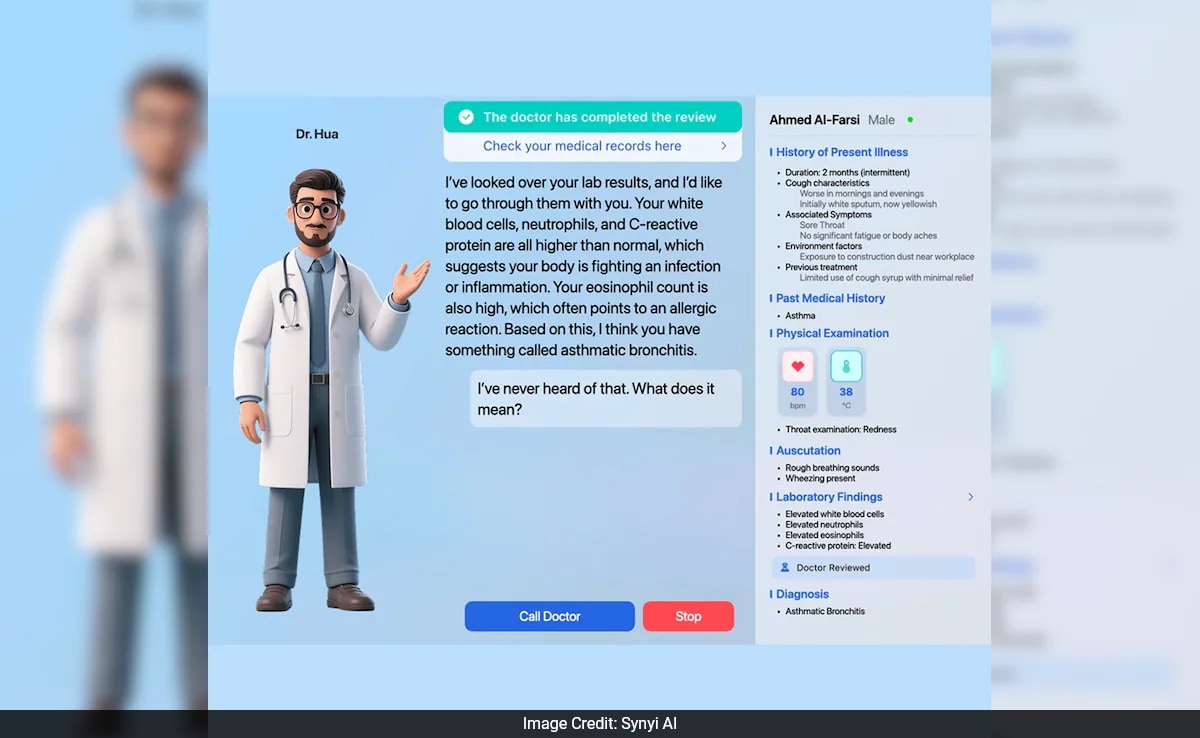Transforming Healthcare with AI: The Launch of the World’s First AI Doctor Clinic
Saudi Arabia has officially taken the lead in the healthcare sector by opening the world’s first clinic where artificial intelligence (AI) is used for patient diagnosis and treatment. The groundbreaking facility, located in the eastern province of Al-Ahsa, was launched through a partnership between Synyi AI, a China-based medical technology company, and the Almoosa Health Group. This innovative trial program began last month and seeks to redefine the medical landscape by introducing AI as the primary point of contact for patients seeking healthcare solutions.
The clinic leverages advanced AI technology to streamline the patient experience, making consultations more efficient while still ensuring safety and accuracy. Patients arriving at the clinic will have their symptoms evaluated by an AI “doctor,” named Dr. Hua, who collects data and analyzes symptoms using a tablet interface. However, despite the AI’s ability to diagnose and propose treatment plans, human doctors remain integral to the system as “safety gatekeepers,” reviewing and approving the AI-generated recommendations.
As per the report by Leaders, the decision to implement AI in healthcare stems from a desire to provide prompt and reliable medical assistance to a growing number of patients in Saudi Arabia. The clinic aims to cater to individuals suffering from respiratory issues, covering around 30 ailments such as asthma and pharyngitis, with plans to expand this list to incorporate 50 different diseases across various medical fields, including gastroenterology and dermatology.
How the AI Clinic Functions: A Step-by-Step Guide
Upon arrival at the clinic, patients interact with Dr. Hua, the AI doctor, via a user-friendly tablet. Dr. Hua engages the patients by asking them a series of targeted questions to gather information about their symptoms. This process mimics a traditional doctor-patient interaction, providing a familiar experience for those seeking care.
To ensure accuracy, Dr. Hua does not solely rely on the patient’s input; it also utilizes images and data collected with the help of human assistants. Once the AI has compiled enough information, it generates a treatment plan which is then reviewed by a qualified human doctor. This dual-layer approach guarantees that while AI is leading the consultation and diagnosis, human expertise is never too far away. In cases where complications arise or emergencies occur, skilled human doctors will be on standby to handle situations that require a personal touch.
The current focus on respiratory illness reflects an immediate need for effective, rapid healthcare solutions, especially in a region where air quality and respiratory conditions are of growing concern. However, Synyi AI has set ambitious goals to broaden the AI’s capabilities beyond this initial scope. The company’s CEO, Zhang Shaodian, emphasizes the importance of this evolution in the healthcare sector. In a statement he said, “What AI has done in the past is to assist doctors, but now we are taking the final step of the journey to let AI diagnose and treat the patients directly.”
What Lies Ahead for AI in Healthcare
The pilot program’s diagnostic data will be meticulously submitted to Saudi health authorities, with an approval process expected to unfold over the next 18 months. Synyi AI claims that during the testing phase, the AI technology demonstrated an impressive error rate of only 0.3%, highlighting its potential effectiveness in a real-world medical setting.
This revolutionary initiative has garnered support from influential investors, including Tencent and Hongshan Capital, signaling a strong financial commitment to the project’s success. This backing not only validates the technology but also paves the way for further innovation in the healthcare sector, potentially inspiring similar projects in other countries.
Synyi AI’s clinic employs localized large language models (LLMs) designed to cater to the region’s specific medical needs. By customizing their AI with local languages and cultural nuances, they aim to build a more effective and relatable healthcare experience for patients. This localization is crucial in ensuring that the AI fully understands patient concerns and is capable of offering accurate and culturally relevant medical advice.
As healthcare technology progresses, the implications of AI in medicine extend beyond mere diagnostics and treatment. The integration of AI into clinics may lead to a dramatic reduction in wait times for patients, an increase in the number of patients treated, and potentially lower healthcare costs overall. This model could serve as a blueprint for clinics worldwide, promoting the efficient use of technology in healthcare systems that struggle to meet patient demand.
Looking Forward: The Future of AI in Medicine
While the notion of an AI doctor may evoke skepticism among many, the steps taken by Synyi AI and Almoosa Health Group demonstrate a commitment to improving healthcare through innovative solutions. The fusion of advanced technology with human oversight could mark the beginning of a new era in medical treatment.
For those interested in learning more about AI in healthcare, you may want to read our detailed article on AI’s Role in Innovating Modern Medicine and the potential impacts on patient care. Furthermore, if you seek insights into healthcare technology advancements, feel free to explore this article on Healthcare Innovations for 2023 and Beyond.
The world is watching as Saudi Arabia embarks on this significant journey into AI-driven healthcare, setting a precedent that could reshape the medical field internationally. The seamless blend of technology and human expertise could very well be the future blueprint for healthcare delivery, ensuring that patients receive timely, accurate, and culturally competent care.
DISCLAIMER
We have taken every measure to ensure that the information in this article and on our social media platforms is accurate, verified, and obtained from reliable sources. For feedback or complaints, please contact us at info@hamslive.com.


